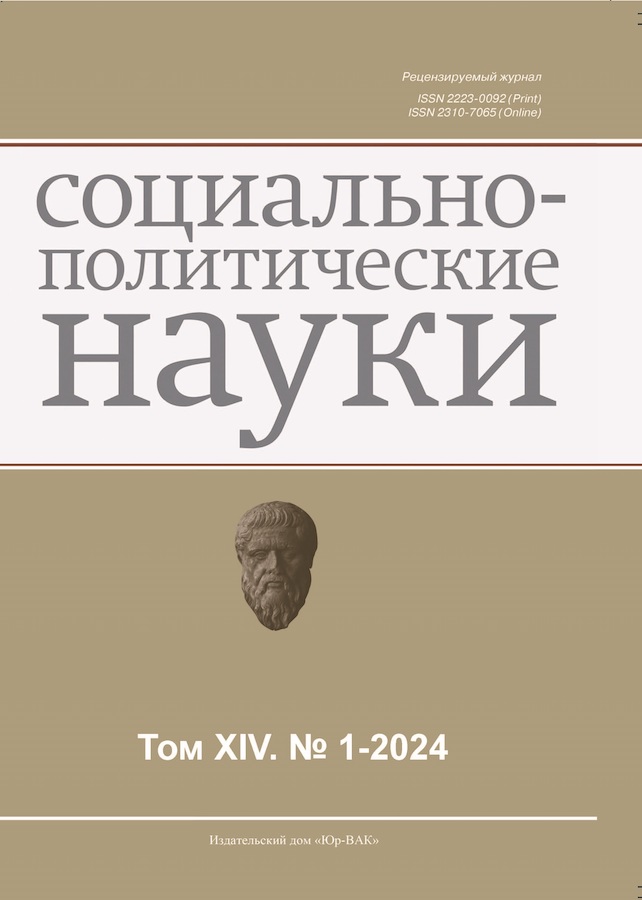Russia’s “soft power” in Kazakhstan: cultural and economic aspects
- Autores: Aleshchenko P.S.1, Kerimov A.A.1
-
Afiliações:
- Ural Federal University named after the first President of Russia B.N. Yeltsin
- Edição: Volume 14, Nº 1 (2024)
- Páginas: 35-40
- Seção: Political Institutions, Processes and Technologies
- URL: https://journals.eco-vector.com/2223-0092/article/view/630526
- DOI: https://doi.org/10.33693/2223-0092-2024-14-1-35-40
- EDN: https://elibrary.ru/CDHOKQ
- ID: 630526
Citar
Texto integral
Resumo
Despite the ongoing geopolitical changes in the modern world, the policy of using “soft power” remains the focus of attention of researchers. The article analyzes the role of Russian “soft power” in Kazakhstan. The author focuses on the cultural and economic aspects of the problem. The key criterion for the success of “soft power” is its attractiveness. Based on this quality, the author analyzes such “soft power” resources as education, the spread of the Russian language, touches on historical memory and emphasizes the importance of economic resources. The article also examines the interest in the region, in particular in Kazakhstan, from foreign countries that are increasing their stay here using the mechanisms of “soft power”.
Palavras-chave
Texto integral
Sobre autores
Pavel Aleshchenko
Ural Federal University named after the first President of Russia B.N. Yeltsin
Autor responsável pela correspondência
Email: aspavel87@mail.ru
ORCID ID: 0009-0002-4157-0731
candidate, Department of Political Sciences
Rússia, YekaterinburgAlexander Kerimov
Ural Federal University named after the first President of Russia B.N. Yeltsin
Email: kerimov68@mail.ru
ORCID ID: 0000-0002-5807-9810
Código SPIN: 8591-7561
Scopus Author ID: 57215904379
Researcher ID: AAG-9905-2019
Dr. Sci. (Polit.), Associate Professor; Professor, Department of Political Sciences
Rússia, YekaterinburgBibliografia
- Boldyrev V.A. Results of the USSR population census. Goskomstat. Moscow: Finance and Statistics, 1990. 49 p.
- Buluktaev Yu.O. The nationalizing type of nationalism: Specific challenges of state building of the Republic of Kazakhstan. Sociopolitical Sciences. 2023. Vol. 13. No. 1. Pp. 38–44. (In Rus.)
- Kerimov A.A., Kabaziev M.S. The ethnic component of the political identity of modern Kazakhstan. Bulletin of the Voronezh State University. Series: History. Political Science. Sociology. 2022. No. 4. Pp. 42–45. (In Rus.)
- Kovba D.M., Isakov A.S. “Soft power”: reception of the concept by Asian states. Izvestia of the Ural Federal University. Series 3: Social Sciences. 2018. Vol. 13. No. 3 (179). Pp. 79–88. (In Rus.)
- Kozlov G.V. Applied analysis of the influence of the “soft power” policy of the USA, Russia and China on Kazakhstan. Post-Soviet Continent. 2020. No. 1. Pp. 32–74. (In Rus.)
- Kosyakina A.S. The Russian approach to the concept of “soft power". Anal and prognosis. Journal of IMMO RAS. 2022. No. 2. Pp. 63–75. (In Rus.)
- Manakov A.G. Possession of the Russian language by the titular peoples of the republics of Russia and neighboring countries. Pskov Regionological Journal. 2021. Vol. 17. No. 3. Pp. 72–91. (In Rus.)
- Nye J. The paradox of american power: Why the world’s only superpower cannot cope with this alone. Oxford University Press, 2002. 240 p.
- Nye J. The future of power. New York: Public Affairs, 2011. 320 p.
- Risse Th. Transnational actors and world politics. Handbook of International Relations. W. Carsnaes, Th. Risse, B.A. Simmons (eds.). L.: Sage, 2002. Pp. 255–274.
- Soft power: Theory, resources, discourse: Monograph. O.V. Rusakova (ed.). Yekaterinburg: Discourse-Pi, 2015. 373 p.
- Taylor P.M. The weapon of reason, the history of propaganda from the Ancient world to our era. Third edition. Manchester: Manchester University Press. 2003. 272 p.
Arquivos suplementares









